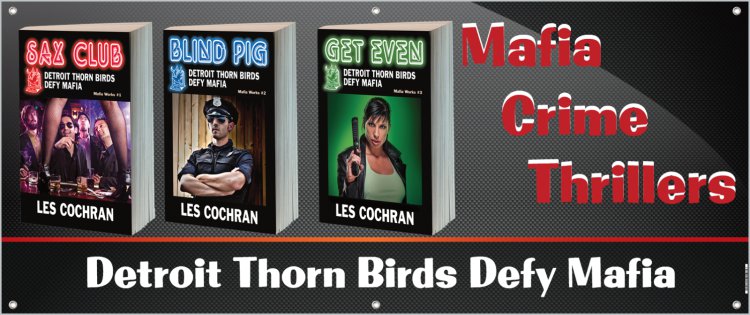Friends and Fans,
This recent Press Release for SAX CLUB, a crime thriller, appeared online at ABC, CBS, NBC, CNN, Fox and many others media networks.
 Historical crime fiction is just that: Historical… crime… fiction. “As an author of an historical crime thriller, it’s imperative I convey a real sense of the times. Nothing is better than going to the original source,” commented author Les Cochran.
Historical crime fiction is just that: Historical… crime… fiction. “As an author of an historical crime thriller, it’s imperative I convey a real sense of the times. Nothing is better than going to the original source,” commented author Les Cochran.
FBI Agent
In writing SAX CLUB: Detroit Thorn Birds Defy Mafia, he conferred with Oscar Westerfield, the Supervisory Special Agent for the Detroit Division of the FBI during the period fictionalized in SAX CLUB. For complete book description, go to author’s website.
The retired FBI agent played a significant role in ensuring accuracy for Cochran’s work of historical crime thriller. He helped bring SAX CLUB alive by narrowing the line between fact and fiction. “Not only did Oscar review the manuscript to ensure its authenticity, he made many valuable literary contributions during hours of interviews.”
FBI Code Words
By Westerfield sharing actual code words used by the FBI, Cochran was able to describe several events using ‘real-to-life’ terms. In some cases, the addition is only a term or phrase, but it adds reality to the story. The use of T-3 is a good example in the following text from SAX CLUB of a discussion between an FBI Agent and a member of the Special Task Force.
“I’ll check with my ‘T-3s’ to see who knows what.”
“‘T-3s,’ what are they?” Kimberly asked.
Will smiled to himself, knowing someone would ask. “It’s part of the code we use to categorize our informants. A ‘T-3’ is the highest rating; it stands for top echelon. It means the informant is very good and highly reliable. Usually they’ve provided accurate information for several years.”
Coffee Shop That Doesn’t Serve Coffee
Another funny episode included from the Westerfield interviews illustrates Cochran’s goal to narrow the line between fact and fiction. In real time, when Jimmy Hoffa came up missing, the FBI had one active bug in a Mafia-run Detroit establishment—referred to as the “coffee shop that didn’t serve coffee.” When a real event like this is fictionalized in this crime fiction thriller, the time comes alive; the reader is there—it’s 1975!
The mob hangout was a coffee shop on Saint Antoine Street in Greektown. A Mafia lieutenant, Dominic ‘Fats’ Corrado, held court there with his cronies. Westerfield pointed out, “Everyone up to the White House was interested in what we might hear. They figured everyone in the mafia ranks would be talking about Hoffa. The FBI techies had placed a bug in the electrical receptacle behind the fridge.”
Bugging and Re-Bugging
As the room filled, Westerfield recalled, the mafia guys started opening the refrigerator door for drinks. It kicked on and the agents couldn’t hear a thing.
“We have the most sophisticated equipment in the world and the damn refrigerator drowns out the conversations.”
The next night the tech agents went back in and disabled the compressor, figuring that’d buy a day or two so they could collect good information. Evidently someone must have noticed the fridge wasn’t working in the early morning, so by the time the guys started pouring in they had installed a new refrigerator. “We heard nothing,” said Westerfield.
The SAX CLUB crime fiction novel is packed with examples like these; readers are there—in the room—with FBI agents and Mafia kingpins! Don’t miss out!
